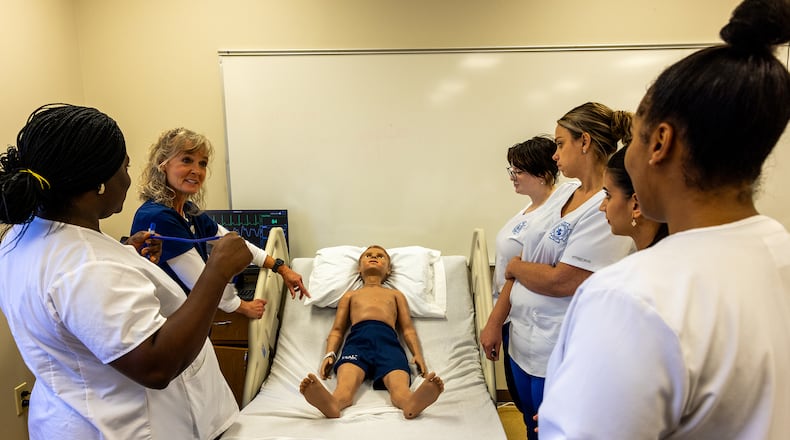Once approved by the HLC, the state will give final approval and then Clark State can begin offering the nursing bachelor’s degree in the fall of 2025.
Clark State President Jo Alice Blondin said this approval shows their commitment to student and healthcare needs.
“Our students obtain vital clinical skills and leadership capabilities that facilitate advancement into higher nursing positions. A complete nursing program from LPN to RN to a bachelor’s degree will empower our nursing students to further their education and careers while also ensuring a steady pipeline of qualified nursing graduates to meet the region’s increased demand for nursing professionals,” she said.
The primary target audience for this new degree would be people who have completed an Associate of Applied Science in Nursing and hold an active unincumbered registered nursing license, said Scott Dolan, dean of Health, Human and Public Services. When the program is fully approved, 15 students will likely be accepted into the first class.
The main difference between a BSN and a registered nurse (RN) is that a BSN is a four-year degree that “prepares nurses for leadership, management, and administrative roles” and includes courses in theoretical work, critical thinking and professionalism. An RN is a license granted by the state, not a degree, Dolan said, explaining the salary may be higher for BSNs and employers may prefer BSN nurses as well.
As far as job growth, registered nurses, acute care nurses, critical care nurses and post-secondary nursing instructors or teachers were projected to grow faster than the average job from 2019-29 and to have greater than 100,000 job openings nationwide for that same time period, according to the U.S. Department of Labor.
Nursing professions with a bachelor’s degree are careers defined as in-demand and of critical need for the state in 2023-24, and there are around 8,000 openings, according to the Governor’s Office of Workforce Transformation Top Jobs List.
Clark State’s nursing program retention rate is 90% and graduation rate is around 98%, according to Garrett Fisher, director of nursing programs. The nursing program at the main campus in Springfield is consistently at capacity, the Beavercreek campus has doubled enrollment since 2023 and the Greene County Career Center has 70 students enrolled in the College Credit Plus nursing pathway.
“Our curriculum is tailored to meet the needs and high standards of today’s nursing professionals,” Fisher said. “To help our students meet those demands, our labs include high-fidelity mannequins that breathe, cry, blink and more so students obtain realistic experiences and practice. We offer interventions to ensure they achieve academic success, such as dedicated study spaces for our nursing students and tutoring both online and in-person.”
Clark State’s School of Health, Human and Public Services oversees the nursing programs, as well as diagnostic medical sonography and paramedic options.
The college offers nursing programs including licensed practical nursing certificates, associate degree for registered nursing (RN), an Advanced Standing nursing program for LPN certificates and RN associate degrees to earn credentials in less time. The Bellefontaine location offers an LPN program, and several local high schools and career centers offer College Credit Plus nursing pathways.
Scholarships and a variety of financial aid options are available for nursing students.
For more information on the programs and aid options, visit clarkstate.edu or call the admissions office at 937-328-6028.
About the Author

